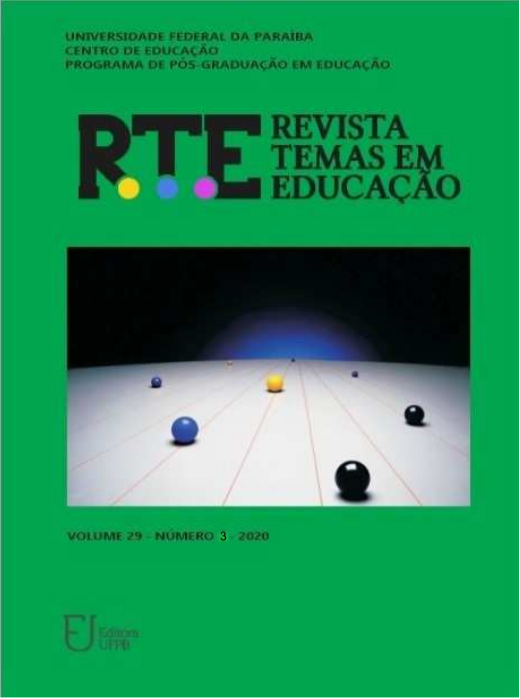FOR A DECOLONIAL PEDAGOGY AGAINST CORPORAL DOCILIZATION, CULTURAL INVASION AND DEPROBLEMATIZATION OF THE EDUCATION IN THE PROYECTO MILITARY SCHOOLS
FOR A DECOLONIAL PEDAGOGY AGAINST CORPORAL DOCILIZATION, CULTURAL INVASION AND DEPROBLEMATIZATION OF THE EDUCATION IN THE PROYECTO MILITARY SCHOOLS
DOI:
https://doi.org/10.22478/ufpb.2359-7003.2020v29n3.55994Keywords:
Civic-Military School, Body Docilization, Cultural invasion, Decolonial PedagogyAbstract
ABSTRACT
The article presents an analytical essay on the militarization of Brazilian public schools, from the perspective of the docilization of bodies, cultural invasion and unproblematization. The Civic-Military Schools Program - PECIM instituted by Decree nº 10.004 / 2019 is united around a conservative agenda, especially with regard to the appreciation for standardization, disciplinarization, documentalization of bodies (FOUCAULT, 1987), cultural invasion ( FREIRE, 1987), particularism in the field of ideas, denial of the school's social role, education as a-social and a-historical process. In order to (re) exist this colonizing project, this study defends decolonial pedagogy as a pedagogical-political presupposition that disrupts the ideological bonds hidden in this project. Subsidized by these issues, the present study intends to reveal the ideological, political, cultural and epistemic intentions of the civic-military schools in Brazil. The study is based on a proposal for a qualitative methodology, anchored in documentary analysis, which uses data from primary sources, which have not yet received analytical treatment, such as laws, resolutions, opinions and others. Thus, it is urgent to conduct studies and research that may denounce the dismantling project in education, based on an ideological guideline centered on conservative and authoritarian ideas, leading to a colonial and militarized curricular conversion in public schools.
Downloads
References
ARROYO, Miguel. Escolas Militarizadas criminalizam infâncias populares. [Entrevista cedida a] Carta Capital, 12 de setembro de 2019. Disponível em: https://www.cartacapital.com.br/educacao/miguel-arroyo-escolas-militarizadas-criminalizam-infancias-populares/. Acesso em: 23 jul. 2020.
BAUER, Martin W.; GASKELL, George; ALLUM, Nicholas C. Qualidade, quantidade e interesses do conhecimento: evitando confusões. In: BAUER, Martin; GASKELL, George. (Org.). Pesquisa qualitativa com texto, imagem e som: um manual prático. Petrópolis: Vozes, 2008. Disponível em: https://tecnologiamidiaeinteracao.files.wordpress.com/2017/10/pesquisa-qualitativa-com-texto-imagem-e-som-bauer-gaskell.pdf. Acesso em: 23 jul. 2020.
BRASIL. Câmara dos Deputados. Projeto de Lei de nº 2.401 de 2019. Dispõe sobre o exercício do direito à educação domiciliar, altera a Lei nº 8.069, de 13 de julho de 1990 - Estatuto da Criança e do Adolescente, e a Lei nº 9.394, de 20 de dezembro de 1996, que estabelece as diretrizes e bases da educação nacional. Disponível em: https://www.camara.leg.br/proposicoesWeb/prop_mostrarintegra;jsessionid=C5F58BD34BAD023F686924361C638DD3.proposicoesWebExterno2?codteor=1739762&filename=Avulso+-PL+2401/2019. Acesso em: 10 dez. 2019.
BRASIL. Câmara dos Deputados. Decreto Nº 10.004, de 5 de setembro de 2019. Institui o Programa Nacional das Escolas Cívico-Militares, 2019. Disponível em: http://escolacivicomilitar.mec.gov.br/. Acesso em: 20 jul. 2020.
BRASIL. Lei nº 9.394, de 24 de dezembro de 1996. Estabelece as diretrizes e bases da educação nacional. Brasília, 20 de dez. 2016. Disponível em: http://www.presidencia.gov.br/ccivil_03/Leis/L9394.htm> Acesso em: 09 jun. 2019.
BRASIL.Constituição Federal da República Federativa do Brasil, 1988. Disponível em: http://www.planalto.gov.br/ccivil_03/constituicao/constituicao. Acesso em: 09 jul. 2020.
BRASIL. Manual das Escolas Cívico-Militar, 2020. Disponível em: http://escolacivicomilitar.mec.gov.br/. Acesso em: 20 jul. 2020.
CANDAU, Vera Maria Ferrão. Diferenças culturais, interculturalidade e educação em direitos humanos. Educ. Soc. [online]., v.33, n.118, p.235-250, 2016.
CORREIO DO POVO. MEC finaliza proposta de ampliação de escolas cívico-militares no país. Disponível em: https://www.correiodopovo.com.br/not%C3%ADcias/ensino/mec-finaliza-proposta-de-amplia%C3%A7%C3%A3o-de-escolas-c%C3%ADvico-militares-no-a%C3%ADs-.319073. Acessado em 13 de outubro de 2020.
FELICIANO, Carlos Alberto; MITIDIERO JUNIOR, Marcos. A violência no campo brasileiro em tempos de golpe e a acumulação primitiva de capital. Okara: Geografia em debate, v.12, n. 2, p. 220-246, 2018.
FREIRE, P. Pedagogia do oprimido. 17. ed. Rio de Janeiro: Paz e Terra. 1987.
FREIRE, P. Pedagogia da indignação: cartas pedagógicas e outros escritos. 1.ed. São Paulo: Editora UNESP, 2000.
FOUCAULT, Michel. Vigiar e punir: nascimento da prisão. Rio de Janeiro: Vozes, 1987.
FRIGOTTO, G. (org.). Escola ‘sem’ partido: esfinge que ameaça a educação e a sociedade brasileira. Rio de Janeiro: LPP/Uerj, 2017. 144 p.
LÜDKE, Menga; ANDRÉ, Marli E.D.A. Pesquisa em educação: abordagens qualitativas. São Paulo: EPU, 1986.
SAVIANI, D. Políticas educacionais em tempos de golpe: retrocessos e formas de resistência. Roteiro, v. 45, p. 1-18, 3 jun. 2020
SKINNER, B. F. Ciência e comportamento humano (J. C. Todorov & R. Azzi, Trads.). São Paulo, SP: Martins Fontes, 2007. (Trabalho original publicado em 1953).
WALSH, C. Pedagogías decoloniales: prácticas insurgentes de resistir, (re)existir y (re)vivir. Tomo II. Quito, Ecuador: Ediciones Abya-Yala, 2007.
WALSH, C. Pedagogias decoloniales caminando y preguntando. Notas a Paulo Freire desde Abya Yala. Revista Entramados – Educacion y Sociedad, v.1, p.17-31, 2014.
RICCI, Rudá. A militarização das escolas públicas. Le Monde Brasil Diplomatique, Edição 134, 2018. Disponível em: < https://diplomatique.org. br/A-MILITARIZACAO-DAS-ESCOLAS-PUBLICAS>. Acesso em: 22 jul. 2020.
Downloads
Published
How to Cite
Issue
Section
License
Authors who publish in this journal agree to the following terms:
. Authors retain the copyright and grant the journal the right to first publication, with the work simultaneously licensed under the Licença Creative Commons Attribution that allows the sharing of the work with acknowledgment of authorship and initial publication in this magazine. . Authors are authorized to assume additional contracts separately, for non-exclusive distribution of the version of the work published in this journal (eg, publishing in institutional repository or as a book chapter), with acknowledgment of authorship and initial publication in this journal.
. Authors are permitted and encouraged to publish and distribute their work online (eg in institutional repositories or on their personal page) at any point before or during the editorial process, as this can generate productive changes, as well as increase impact and citation of the published work (See O Efeito do Acesso Livre).



















